Origins
In the mid-1950s, the economists who would become the Berkeley Mafia were students at the Faculty of Economics at the University of Indonesia (FEUI). The faculty was headed by Sumitro Djojohadikusumo, an economist who had served as Minister of Trade and Industry and Minister of Finance for the Government. Sumitro was the only teacher with an economics doctorate and so had to turn to foreign lecturers from the Netherlands and lecturers from other faculties to assist in educating the students at FEUI. [3]
As tensions grew between Indonesia and the Dutch government over West Irian (now known as West Papua), Dutch lecturers began to leave the country. Sumitro turned to the Ford Foundation for assistance. [3] The Ford Foundation then began a process by which students from the FEUI were chosen to undertake overseas studies at the University of California, Berkeley. After the Ford Foundation had conducted some preliminary preparations, the overseas studies program began in 1957. By the early 1960s, all of the students who had been sent abroad had returned from Berkeley and had begun taking up positions as lecturers at the Army Staff and Command College (SESKOAD). [4]
In 1966, General Suharto took over executive control in Indonesia from President Sukarno in a coup by virtue of Supersemar. Although he would not formally become president for another two years, Suharto began laying down the foundations for what would become the New Order regime. In late August 1966, Suharto held a seminar at SESKOAD to discuss political and economic matters and the way in which the New Order would approach those problems. The FEUI economists, headed by Widjojo Nitisastro, attended the seminar.
During the seminar, the economists set out their ideas and policy recommendations. Their presentation impressed Suharto, who invited them to begin work as a team of experts in the field of economics and finance. [5]
Accomplishments and controversies
On October 3, 1966, on the advice of these economists and others, Suharto announced a program aimed at stabilization and rehabilitation of Indonesia's economy. [4] The Berkeley Mafia focused on low inflation, fiscal constraint, and market deregulation. [6] The program also aimed at rehabilitation of infrastructure and development of the agricultural sector. At the same time, an international program to support economic recovery was established under the auspices of a newly-formed Inter-Governmental Group on Indonesia.
The new economic program was successful at stabilizing the economy. Inflation fell from 650% in 1966 to only 13% in 1969. [7] After Suharto became president in 1968, the members of the Berkeley Mafia team were appointed to ministerial and senior advisory posts in Suharto's cabinet. Thus, the group had a great influence on economic policy and successfully brought Indonesia's economy to an unprecedented growth period. The growth rate was high, averaging around 6.5% per year between the late 1960s and 1997, when South East Asia was hit by the severe Asian financial crisis. [6]
The Berkeley Mafia's liberal approach towards economics was not supported by everyone. Within the New Order, it encountered opposition from generals such as Ali Murtopo, Ibnu Sutowo and Ali Sadikin, whose economic approaches were more nationalistic in nature. [8] Some other groups, like the Indonesian branch of Hizb ut-Tahrir, considered the Berkeley Mafia to be traitors, a view stemming particularly from its willingness to privatise the nation's industries. [9] With the beginning of the oil boom in the mid-1970s, Suharto favored the economic nationalists and so the Berkeley Mafia's influence was restricted.
Suharto would turn to the Berkeley Mafia again in the mid-1980s, when the price of oil began to drop and with it Indonesia's economic growth. The Berkeley Mafia presided over the liberalization, deregulation, and the renewed growth of the Indonesian economy. [10] Once again, the Indonesian economy began to grow, and once again, the Berkeley Mafia encountered political opposition. This time, their opponents were Sudharmono and Ginandjar Kartasasmita, who advocated economic nationalism, as well as BJ Habibie, who wanted a technology-centered economic development. As on the previous occasion, Suharto sided with the economic nationalists, and the Berkeley Mafia's power weakened.
During Indonesia's economic collapse from the 1997 Asian financial crisis, people blamed the Berkeley Mafia and considered it to be part of the New Order regime. During the Reform era, only Widjojo was retained in the government.
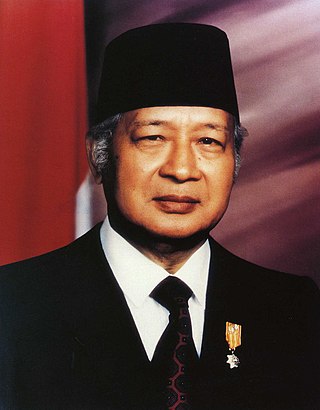
Suharto was an Indonesian army officer and politician, who served as the second and the longest serving president of Indonesia. Widely regarded as a military dictator by international observers, Suharto led Indonesia through a dictatorship for 31 years, from the fall of Sukarno in 1967 until his own resignation in 1998. The legacy of his 31-year rule, and his US$38 billion net worth, is still debated at home and abroad.

Kwik Kian Gie is an Indonesian economist and politician who served as the Coordinating Minister for Economic Affairs from 1999 to 2000, the Minister of National Development Planning from 2001 to 2004, as well as briefly serving as the Deputy Speakers of the People's Consultative Assembly in 1999. He is a prominent Indonesian economist who often wrote columns in the newspaper KOMPAS criticizing the policies of the Suharto administration in the late 1980s and 1990s.

Selo Soemardjan, also spelled as Selo Sumarjan or Selo Sumardjan, was a well known senior academic in sociology at the University of Indonesia, and is known as the Pioneer of Indonesian Social Sciences. He was awarded with the title Kanjeng Pangeran Haryo, a knighthood from the Yogyakarta Sultanate.

The Fifth Development Cabinet was the Indonesian Cabinet which served under President Suharto and Vice President Sudharmono from March 1988 until March 1993. It was formed after Suharto was elected to a 5th term as president by the People's Consultative Assembly (MPR).

The Fourth Development Cabinet was the Indonesian cabinet which served under President Suharto and Vice President Umar Wirahadikusumah from March 1983 until March 1988. The Cabinet was formed after Suharto was elected to a 4th term as President by the People's Consultative Assembly (MPR).

The Third Development Cabinet was the Indonesian Cabinet which served under President Suharto and Vice President Adam Malik. The Cabinet was formed after Suharto was elected to a third term as president by the People's Consultative Assembly (MPR).

The Second Development Cabinet was the Indonesian Cabinet which served under President Suharto and Vice President Hamengkubuwono IX. The Cabinet was formed after Suharto was elected to a 2nd term as President by the People's Consultative Assembly (MPR). It has the distinction as the last Cabinet which contains members of the United Development Party (PPP) and the Indonesian Democratic Party (PDI). After this Cabinet and until Suharto's fall in 1998, all the other Development Cabinets would be dominated by members of Golkar and ABRI.

The First Development Cabinet is the name of the cabinet of the Indonesian government led by President Soeharto. This cabinet was announced on June 6, 1968 and served from June 10, 1968 to March 27, 1973. The composition of this cabinet is not much different from the composition of ministers in the Revised Ampera Cabinet. Shortly after the 1971 elections, on September 9, 1971, President Soeharto announced a reshuffle of the First Development Cabinet and appointed the reshuffled ministers on September 11, 1971.
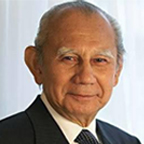
Emil Salim is an Indonesian economist and former politician. Born of Minangkabau parents, both from the village of Koto Gadang in West Sumatra. His uncle is Agus Salim, one of the founding fathers of the Republic of Indonesia and Minister of Foreign Affairs in the early 1950s.

Ali Murtopo was a prominent Indonesian general and political figure during the first half of General Suharto's New Order regime.
Sumitro, or Soemitro was a prominent Indonesian General in the early years of General Suharto's New Order before suddenly falling from grace in January 1974 after the Malari incident.

Mohammad Sadli was a leading Indonesian policy-maker and economist.
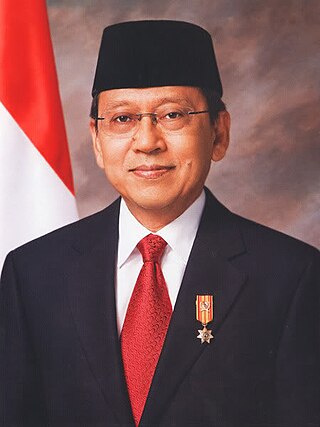
Boediono is an Indonesian economist and former politician. He is the 11th vice president of Indonesia, in office from 2009 to 2014. He became vice president after winning the 2009 presidential election together with the then-incumbent President Susilo Bambang Yudhoyono.

J. Soedradjad Djiwandono is an Indonesian economist who was Governor of Bank Indonesia, the nation's central bank, from 1993 until his sudden dismissal in 1998.

Widjojo Nitisastro was an Indonesian economist, who was known as the main architect of the Indonesian economy during the New Order regime of president Suharto, serving as Minister for National Development (1971–1983) and Coordinating Minister for Economy, Finance and Industry (1973–1983). He was one of Indonesia's best-known and most respected economic policy-makers, both within Indonesia and overseas.
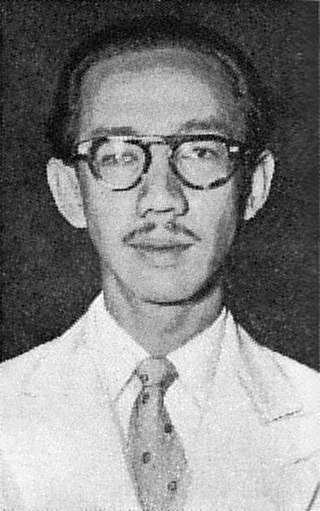
Sumitro Djojohadikusumo was an Indonesian politician and one of the country's most influential economists. He held notable roles under both presidents Sukarno and Suharto intermittently between 1950 and 1978. During his career in government, he served as Minister of Industry and Trade, Minister of Finance, and the Minister of Research in five different cabinets. He was also the Dean of the Faculty of Economics at the University of Indonesia.

Johannes Baptista Sumarlin was an Indonesian economist who served as Minister of Finance. Sometimes linked with the so-called Berkeley Mafia group of economic advisers which included senior Indonesian economists such as Widjojo Nitisastro, Emil Salim and Ali Wardhana, Sumarlin held various important economics posts in the Indonesian government for many years until the late 1990s. He graduated from the Faculty of Economics, University of Indonesia (FEUI) in 1958. Positions held in government included, among others, Chairman of Supreme Audit Agency, Minister of Finance, Chairman of the National Planning Agency (Bappenas), and Minister for Administrative and Bureaucratic Reform.

Muhamad Chatib "Dede" Basri is an Indonesian economist and was the Minister of Finance in the Second United Indonesia Cabinet between 21 May 2013 and 20 October 2014 when the term of the administration of the Susilo Bambang Yudhoyono was completed. Before his appointment as Minister of Finance he was chair of the Indonesian Investment Coordinating Board.
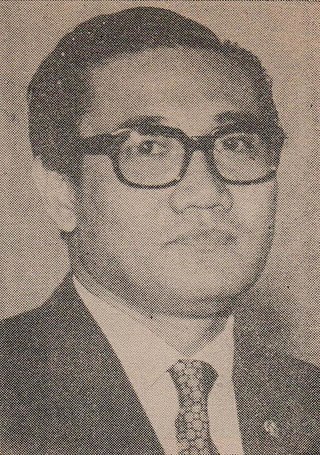
Ali Wardhana, more colloquially known as Bung Ali, was an Indonesian professor and economist, who served as the third Coordinating Minister for Economics, Finance, Industry, and Development of Indonesia from 1983 until 1988 and the 21st minister of finance of Indonesia from 1968 until 1983. He was one of Indonesia's most senior economic policy-makers during the New Order regime of president Suharto, being a member of the influential Berkeley Mafia, a group of American educated Indonesian economists who shaped the Indonesian economy during the New Order. He was the longest serving Minister of Finance, as well as the fifth longest serving minister in Indonesian history.

Bambang Subianto was an Indonesian academic and technocrat who served as Minister of Finance from 1998 to 1999. Before assuming the post of finance minister, Bambang worked in the Department of Finance for about a decade.















